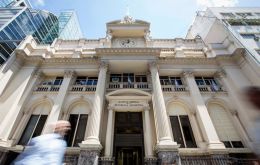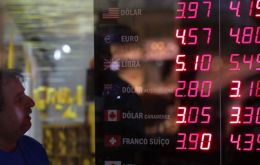MercoPress. South Atlantic News Agency
Tag: emerging markets
-
Wednesday, June 24th 2020 - 11:57 UTC
MSCI warns that the Argentina Index could be removed from the MSCI Emerging Markets Index

MSCI Inc, the world’s largest index provider, warned on Tuesday that the MSCI Argentina Index could be removed from the MSCI Emerging Markets Index should it become harder for foreign investors to access its stock market.
-
Tuesday, April 14th 2020 - 19:31 UTC
IMF: Uruguay's economy will fall 3% in 2020; Latin America's, 5.2%

According to the estimates of the International Monetary Fund (IMF), the Uruguayan economy will decrease by 3% this 2020. The “great closure” has been how the international body has defined, as the title of its World Economic Outlook, government measures against the global pandemic caused by the COVID-19.
-
Friday, April 10th 2020 - 15:45 UTC
IMF sees emerging markets and low income nations as the most exposed to the coming recession

The International Monetary Fund sees the world economy suffering its worst recession since the Great Depression this year, with emerging markets and low-income nations in Africa, Latin America and Asia at particularly high risk.
-
Wednesday, January 30th 2019 - 08:48 UTC
Emerging markets vulnerable to US higher rates and stronger dollar

Emerging markets face more downgrades than upgrades this year as foreign debt levels leave them vulnerable to rising U.S. interest rates and the strength of the dollar, according to Fitch Ratings. Latin America, the Middle East and Africa will be impacted more by lower credit scores because of the high share of their foreign-currency debt, said James McCormack, Hong Kong-based global head of the sovereign and supranational group at Fitch.
-
Saturday, October 27th 2018 - 09:50 UTC
Markets confident of Bolsonaro victory: stocks up 2% and Real logs sixth straight sessions' win

Brazilian stocks index, Bovespa, rose nearly 2% on Friday ahead of this weekend's presidential election, whole Brazil's Real further consolidated. The MSCI's index of emerging market stocks in the region gained 1.24%. Although, the region's markets fared better than emerging markets elsewhere, they were on track to end a five-week winning streak.
-
Friday, October 5th 2018 - 08:36 UTC
Argentine Peso slips on Thursday on prospects of higher US interest rates

Argentina’s Peso fell on Thursday, pressured by the recession-hit country’s dismal inflation outlook and higher U.S. interest rates that have pushed capital away from riskier emerging markets and toward the greenback, local traders said. The peso shed 1.85% to close at 38.4 per dollar after having gained 9.58% over the previous three days under a freshly-renegotiated International Monetary Fund financing deal that calls for tougher fiscal and monetary policy measures.
-
Friday, August 24th 2018 - 08:24 UTC
Brazilian currency sliding to record lows ahead of October's election outcome

The Brazilian currency Real fell to a 31-month low versus the U.S. dollar on Thursday on jitters ahead of the country’s October election. Jitters across emerging markets caused by a stronger U.S. dollar and exacerbated by the unfolding currency crisis in Turkey already took a toll on the Brazilian unit before this week.
-
Thursday, February 20th 2014 - 04:18 UTC
IMF concerned with risks in emerging markets from pulling back stimulus too quickly

Advanced economies, including the United States, must avoid pulling back stimulus too quickly given the weak global economic recovery and recent market volatility highlights key risks in some emerging markets, the International Monetary Fund said on Wednesday.
-
Wednesday, January 29th 2014 - 20:31 UTC
Lagarde admits volatility in global markets as strong economies tighten monetary policy

Monetary policy tightening in advanced economies will cause volatility in international markets this year and impact the monetary situation of some emerging economies, IMF Managing Director Christine Lagarde cautioned on Wednesday.
-
Wednesday, October 31st 2012 - 20:51 UTC
India/Brazil with highest government debt/GDP ratios among leading emerging economies

India and Brazil have the highest government debt ratios at almost 70% of GDP among top ten emerging market economies, according to a report by Deutsche Bank.
